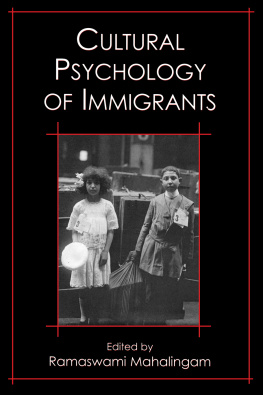IMMIGRANT ENTREPRENEURS AND IMMIGRANT ABSORPTION IN THE UNITED STATES AND ISRAEL
Immigrant Entrepreneurs and Immigrant Absorption in the United States and Israel
Edited by
IVAN LIGHT
University of California at Los Angeles
RICHARD E. ISRALOWITZ
Ben-Gurion University of the Negev
First published 1997 by Ashgate Publishing
Reissued 2018 by Routledge
2 Park Square, Milton Park, Abingdon, Oxon OX14 4RN
711 Third Avenue, New York, NY 10017, USA
Routledge is an imprint of the Taylor & Francis Group, an informa business
Copyright Ivan Light and Richard E. Isralowitz 1997
All rights reserved. No part of this book may be reprinted or reproduced or utilised in any form or by any electronic, mechanical, or other means, now known or hereafter invented, including photocopying and recording, or in any information storage or retrieval system, without permission in writing from the publishers.
Notice:
Product or corporate names may be trademarks or registered trademarks, and are used only for identification and explanation without intent to infringe.
Publishers Note
The publisher has gone to great lengths to ensure the quality of this reprint but points out that some imperfections in the original copies may be apparent.
Disclaimer
The publisher has made every effort to trace copyright holders and welcomes correspondence from those they have been unable to contact.
A Library of Congress record exists under LC control number: 97070893
Typeset by Catherine T. Logan Mabuim, No 1 DN HaNegev 85360 Israel
ISBN 13: 978-1-138-31729-1 (hbk)
ISBN 13: 978-0-429-45186-7 (ebk)
Contents
Ivan Light & Stavros Karageorgis
Ivan Light, Georges Sabagh, Mehdi Bozorgmehr & Claudia Der-Martirosian
Judah Matras
Eran Razin
Richard E. Isralowitz and Ismael Abu Saad
Ismael Abu Saad and Richard E. Isralowitz
Julia Wrigley
Hye-Kyung Lee and Stavros Karageorgis
Alex Stepick and Tareena Joubert
Jonathan Friedlander, Mehdi Bozorgmehr and Ron Kelley
Steven Gold
Many nations invite foreigners to work within their borders, but few welcome them. When nations welcome foreigners, they offer them the same political rights that their own citizens already enjoy. Citizenship is the most basic right, but social and economic rights are important too. Of the many nations that accept or tolerate foreigner workers, only five now encourage foreigners to migrate, to settle permanently, and then to obtain citizenship and naturalization. These are Australia, Canada, Israel, New Zealand, and the United States.
The four English-speaking countries on this list have become pluralist democracies whose national self-conception now includes immigrants outside what Canadians call the charter groups. Charter groups are those immigrant groups that were present when the modern state and society first came into existence. Admittedly, the history and culture of the charter groups dominate these four societies to this day, and foreigners entering them still feel social pressure for acculturation to their Anglophone standard or, in the case of Canada, their Anglophone or Francophone standard. Possibly these societies once differed in the extent to which they exposed immigrants to assimilation pressure, with Canada the most tolerant of the four. However, whatever international differences in assimilation pressure once existed, Reitz and Breton (1994, p. 29) have shown that Canada and the United States do not differ any more in this respect. Indeed, with the exception of Canadas Quebec Province, all four societies have abandoned acculturation and assimilation as official policy goals. Their publics have importantly, if incompletely, renounced the ideological demand as well, leaving to immigrants the decision of whether, how much, and how soon they should acculturate and assimilate. This policy they call multiculturalism. Multiculturalism dominates the social agenda of all four of these immigrant-reception societies.
Israel resembles the other four immigrant-reception countries with respect to its ethnic pluralism, but differs from them in its assimilationist ideal. Accepting immigrants equally from all corners of the world, and without racial restrictions, Israel imposes an ethno-religious test of fitness for naturalization. Only Jews are acceptable for automatic naturalization under Israels law of return. Yet, despite that preliminary selection, the Israeli process creates what is arguably the most ethnically diverse population of the five immigrant-reception societies, in terms of the high percentage of foreign-born residents and those who speak two languages. On the grounds of how pluralistic the recipient society is, one cannot distinguish Israel from the other immigrant-reception societies. Nor can one dismiss the comparison of Israel and the United States on the grounds that Israel is a small country, and the USA a big one. The key immigration issue is always the speed of absorption effort rather than the absolute size of the immigrant population.
Regardless of size, rapid immigration poses an absorption problem that taxes societys ability to cope. Even if immigration has long-run benefits for reception societies, as we believe it does, very rapid immigration imposes the same absorption problem on society that a person experiences who tries to swallow a grapefruit whole. A nutritious food, which supports ones health if eaten section by section, grapefruit swallowed whole will harm ones health, not improve it. Immigration is very rapid in the USA now, but it is even more rapid in Israel. Between 1970 and 1990, the United States received 14 million immigrants, who increased its population by 6%. Between 1989 and 1992, Israel received 300,000 immigrants, who increased its population by 6% as well. In other words, in only four years, Israel added proportionately as many immigrants to its population as did the United States in twenty years.1 Obviously, one cannot reject Israels immigration experience on the grounds that the small size of the immigrant cohort renders that experience of no international interest.
The appropriate grounds for distinguishing Israels immigration from that of the United States are ideological, not demographic. Unlike the pluralist democracies, which have embraced multiculturalism, Israel still asks both acculturation and assimilation from its immigrants.2 Acculturation means fluency in Israeli culture and in the Hebrew language. Assimilation means ultimate absorption of ethnic groups by intermarriage, exclusive identification of immigrants with Israel, elimination of inter-group prejudice, and the internal absence of ethnic conflict. Immigrants to Israel confront a state and a civil society that demand Hebraization as promptly as realistically possible. Hebraization is the process whereby Jewish immigrants to Israel shed their diaspora-derived ethnic cultures, including their foreign names, and acculturate fully to Israeli society. As a state, Israel formally retains the Zionist goal of forging a homogeneous nation out of the ethnically pluralist Jews of the in-gathered diaspora. Israels civil society supports and endorses this Zionist goal; and those who emigrate to Israel have implicitly accepted it as well. On the side of the immigrants and on the side of the recipient society, foreign and native-born Israelis agree that acculturation and assimilation are desirable long-term goals.








